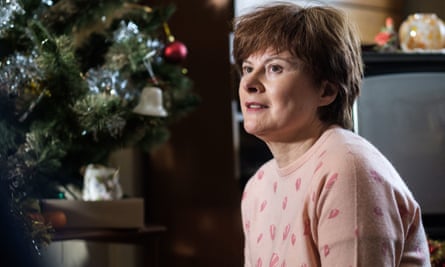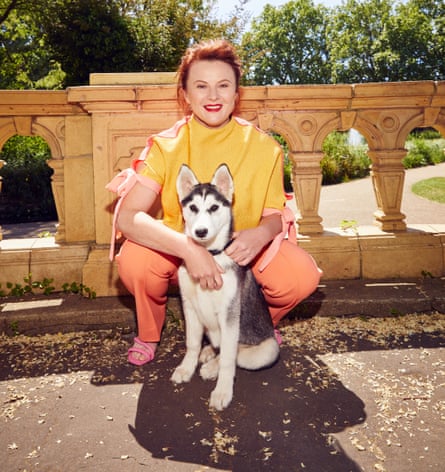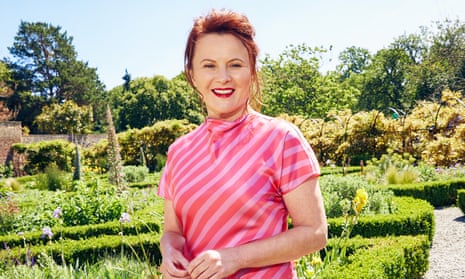Monica Dolan has worn a lot of cardigans over the course of her long acting career. She has become one of those actors whose involvement in a project all but guarantees quality. She has a tendency to play characters who wrap themselves up in a sturdy knit; women who look harmless, or appear invisible, to the wider world. But tug at the threads of those characters and the idea of safety soon unravels. She won a Bafta for her portrayal of the serial killer Rose West in 2011, and recently appeared in one of the year’s best dramas, The Thief, His Wife and the Canoe, as Anne Darwin, imprisoned for fraud after helping her husband, John, to fake his own death. Dolan jokes that her nieces have told her off for taking so many “cardigan” roles. “They say I ought to do something more glamorous and not wear so many cardigans. But I think they’ve given up now,” she says.
It is a sunny afternoon in Hammersmith, where she has lived for many years, and we meet in a café by the Thames. She has brought along Velma, her four-month-old husky puppy, much to the delight of everyone here. Around half our conversation is work-based, the rest is all canine. Velma is Dolan’s first dog, as an adult. She chose a husky because growing up, in Woking, she lived across the road from a family who bred them. “I was there all the time. I completely fell in love with them.” Dolan, who is also a playwright, is very good at telling a story. One day, when she was four, she says, the dogs escaped. The owners were on holiday. “My mum got most of them in the car, but the dad, Boris, was quite aggressive.” Boris had made his way to a local cricket field where he was surrounded by local police. “Apparently, I went up to the dog and he growled, so I said [she puts on a stern voice]: ‘Boris!’ and he just followed me. I don’t quite seem to have the same effect on Velma at the moment,” she adds, smiling. Velma is sitting underneath Dolan’s chair, every bit the model puppy.
We are here to talk about My Name is Leon, the BBC’s adaptation of the Kit de Waal novel, a lovely, touching film in which Dolan plays Maureen, a foster carer in 1980s Birmingham (she wears a cardigan). But there are sharp edges to the story: racism, mental illness, deep injustice, a care system that isn’t working. “I thought the script was one of the best I’d ever read,” she says. “It was very ready. Even the times of day were written in the scene headings, so it was very clear. That’s so important, because then everyone knows the tone of it and knows what they’re making.”

It required a Birmingham accent, which Dolan wraps around the words “Curly Wurly” with ease. It has an unlikely origin. “I listened to White Dee,” she explains. White Dee, aka Deirdre Kelly, was a breakout character from the Channel 4 docu-series Benefits Street. “She did an interview with Emily Maitlis on Newsnight. It’s a good interview, actually. I listened to that, over and over, and watched it every day before we started.” Dolan loves doing accents and studies them in depth. She did Welsh in the BBC comedy W1A, and Rose West’s Gloucester accent in Appropriate Adult. She did a Bronx accent for a recent theatre job, Doubt, at the Chichester Festival Theatre. She found Anne Darwin’s Hartlepool accent tougher to master, but worked with a dialect coach until she had it. She and her co-star, Eddie Marsan, who played John Darwin, kept up their characters’ voices for the duration of filming, but, she says, that’s just practical. “It’s the muscles in your face,” she adds, touching her jaw. It makes sense to keep exercising the same ones. She is practical about her job and seems practically allergic to anything too pretentious-actorly.
Dolan has a personal connection to the northeast, too. She was born in Middlesbrough to Irish parents – her mother is from Enniscorthy and studied botany and biochemistry, and her father was a chemical engineer from Dublin. She was one of four siblings and they moved around a lot, following her father’s work – Essex, Durham, Bexleyheath and Stockton, before eventually settling in Woking, where her mother still lives. “So, although I wasn’t speaking in that accent when I was young, I was hearing a lot of it and there’s a really warm association with it. It definitely went in.”
Canoe, as she calls it, was a hit. As we talk, Dara Ó Briain comes over, apologetically, to tell Dolan how much he loved her in it – naturally, we joke that she has paid him to do so. She says she didn’t know much about the case before she took the job, though she remembers hearing about John Darwin’s return, on the news, before the full extent of what had happened became clear. “The first thing I remember was that this man has walked into a police station, saying he has amnesia and that they think it’s the missing canoeist, and everyone’s saying, ‘Oh wow, God, that’s amazing.’”
She never met Anne Darwin. Halfway through filming, during a pause caused by Covid, Dolan went to a barbecue, where she ended up chatting to someone who knew David Leigh, the journalist who broke the story of the Darwins’ fraud. He put her in touch with Leigh, who showed her some of Anne Darwin’s letters from prison. “After he’d spoken to me, he did ask her. He said, how would you feel about meeting Monica? And she said, ‘No, I’d rather not.’ And I get that.”

Until I watched the drama, I hadn’t known that Anne Darwin was given a longer sentence than her then- husband. “Yes. He got six years and three months and she got six years and six months. I think maybe there was an element of moral judgment of her, and, in a sense, maybe that should have been left to her family.”
When Dolan was first reading the scripts for Canoe, she told the programme-makers that she was worried Anne was being let off the hook too much. “I wanted to see her lying more, because, well, she did, and I could see that the writer wanted us to feel sympathy for her. But I also felt it was more fun to come into a scene where she just lied, or somebody is saying that she has lied. We’ve all lied at some point,” she says. “That’s what makes it so effective, I think. It’s done well, because it’s about forgiveness, not denying that she’s done it. What that family has achieved in terms of forgiveness is quite extraordinary.”
The cast are planning to meet up for drinks tonight, to celebrate the show’s success and to catch up. Marsan can’t make it, as he’s filming elsewhere, but I called to ask him about working with Dolan. “Personally, I think she’s one of the greatest actresses of our generation and I’d always wanted to work with her,” he said. He told me that he auditioned to play Fred West in Appropriate Adult (the part went to Dominic West) and was disappointed that he didn’t have the chance to work with her back then. What is it about her? “She disappears, because she’s not vain, in any sense. She loses herself, but not in an indulgent way.” He compared her to Olivia Colman, with whom he has also worked, in the sense that it has taken the industry a few years to work out what to do with her. “Ooh,” Dolan laughs when I mention it. “I’ll wait and see what it does with me, then.”
I say that it feels like your moment. “This is my moment…” she sings, slipping into the Martine McCutcheon classic. “I think I’ve been really lucky. I’ve worked a fair amount, but also, I get bored quite easily, which I suppose is good and bad. That means if I’ve done one role, then I’ll want to do something very different.” It explains the restless feel to her screen career (her stage career is just as varied). From comedy (Alan Partridge, W1A) to period dramas (Wolf Hall, Vanity Fair), via films such as Days of the Bagnold Summer, The Dig, Pride, Black Mirror, Strike, Inside No 9, the revived Talking Heads… she’s done them all. “I think your characters stretch you as well. You learn more about people and what people are capable of. And when you’re playing people doing quite extreme things, you see what’s possible and imaginable.” She and Marsan are both drawn to what she calls “extreme characters”; they had a joke about that, on the set of Canoe, where they’d turn to camera and pretend they were on a version of the genealogy show Who Do You Think You Are? They called it Who The Fuck Am I?

Dolan’s work ethic sounds prodigious. Early in her career, a theatre director advised her to look at the jobs in front of her, rather than allowing herself to be guided by wider ambitions. For example, if she was being offered a play, then she should consider the merits of that play, rather than thinking about whether she’d prefer to do television or a film. That principle has guided her since she began. “It means you’re going with your gut a lot and that’s quite a nice way to try to stay true to yourself,” she says.
If she was offered a big US series, which required her to sign up to the same role for seven years, say, would she do it? “If it was in front of me and I read it, I might. But I’ve never been very good at commitment. I wanted to be a Brownie and, after a week, I wanted to leave. My mum said no, if you were in the army, you wouldn’t be able to leave after a week. So I had to stay.”
Dolan’s family is full of scientists. If she had to do something in the public eye, then her mother would have liked her to have become a newsreader. Has she come around to the acting now? “I think it might be her botany side, but it’s like I’m a weird plant in the corner and she’s watching to see what it’s going to do next,” she laughs. Her father was a prize-winning physicist in Ireland and at Imperial College London; there is a mathematics award named after one of her sisters. “So I wasn’t going to hit it big with my family in academia.”
She is a British/Irish citizen now, having applied for her Irish citizenship two days after the Brexit referendum result. (Her uncle’s uncle was Joseph Mary Plunkett, the revolutionary who signed the Irish Proclamation and was executed by the British in 1916.) She had always wanted an Irish passport, but her parents said no, that she should have the opportunities that a British passport would provide. “I know this sounds strange, but after getting my Irish citizenship, I really did feel more like myself. Once I got that, something landed, and I felt more whole. Because I’m British and I’m Irish, and it was nice to be able to be both.”

Acting began for Dolan at school, and she did youth theatre in Guildford as a teen. “I just liked showing off, which is part of the job description.” She applied for drama school, but didn’t get in for two years, so she worked at the job centre and tried again, until she did get in. “My biggest regret is that I didn’t keep a diary, because it was an interesting time, in terms of employment and unemployment.”
When she left drama school, she started working, and never really stopped. It was Appropriate Adult, in 2011, that won her a Bafta, her first big award, for best supporting actress. It came at a time when she was feeling frustrated with her career, as if it wasn’t really happening for her. “As we all do, at certain times,” she says. Her late agent had told her that she just needed a little bit of something. “He said you just need a bit of fairy dust at this point.” The Bafta was the fairy dust. When she accepted the award, she made sure to talk about the Wests’ victims. “Because with so many of them, nobody noticed that they’d gone. Very often, after something dreadful has happened, we talk about how much we care about people. But I think we need to care about people all the time.”
She was reluctant to play West, at first. “I just wasn’t interested in that kind of thing. But the problem was, by the time it was time to say yes or no, I’d already looked at her quite a lot and I was quite interested in her by then.” Dolan’s preparation and attention to detail is legendary – Marsan called it “unbelievable”. Her agent was canny enough to drip-feed her more and more enticing news about Appropriate Adult, as she put off saying yes or no. “Emily Watson was doing it, then Dominic West was doing it, and then you go, oh this sounds like it could be quite good, and responsibly done.” She is terrifying as West, who, coincidentally, was in prison with Anne Darwin for a time, though won’t accept much credit for it. “A lot of people said I was scary, but they lit me like that, and they had the camera there, to make it look more sinister.”

Understandably, given some of the characters she has played, but also because she seems no-nonsense about that kind of thing, she is firm about there being no blurred lines between her work and who she is. “I remember Mike Leigh saying there’s nothing more embarrassing than somebody mixing themselves up with their character,” she says. It’s not that she minds being embarrassed, exactly. “The thing is, if you start thinking what you would do instead of what they would do, then you’re very limited. You’re just doing what you would do. The joy, I find, is your imagination working. That’s what’s really exhilarating.” She likes finding out why people behave the way they do, even in the darkness. “Though sometimes you’ve got to think to yourself, maybe it’s time to do a musical,” she laughs.
For now, Dolan is taking a short break, to look after Velma. “I can’t believe I wasted so many years not having a dog,” she says, but she has finished work on her next film, Typist Artist Pirate King, directed by her friend Carol Morley, in which she plays the artist Audrey Amiss, who goes on a road trip with a psychiatric nurse played by Kelly Macdonald. “It’s looking at the interface between mental health and art and artistic talent,” she says. “I’m still friends with Kelly, which is amazing, because I must have been a bit of a handful on that.” It sounds like a characteristically Dolan role: unusual, challenging and unafraid to ask big questions. As Martine McCutcheon would say, this is her moment.
My Name is Leon is on BBC iPlayer now
Stylist Hope Lawrie; makeup by Charlotte Reid at One Represents using Victoria Beckham Beauty; hair by Chad Maxwell at One Represents using Maria Nila; shot on location at Fulham Palace
